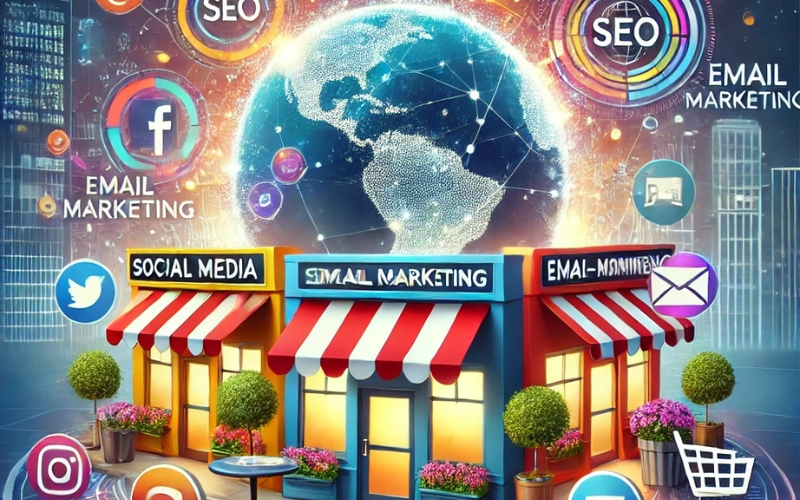Digital marketing has emerged as a game-changer for small businesses, providing tools and strategies that empower them to compete with larger organizations. Unlike traditional marketing methods, Digital Marketing Transforms Small Businesses by offering cost-effective, measurable, and scalable solutions, making it an ideal choice for growth in the digital age. By leveraging digital platforms, small businesses can expand their reach, connect with customers on a personal level, and build long-lasting relationships that drive loyalty and repeat business. This article explores how Digital Marketing Transforms Small Businesses, focusing on three key areas: expanding reach beyond local boundaries, offering cost-effective solutions with measurable results, and building strong customer relationships.
Expanding Reach Beyond Local Boundaries

Digital Marketing Transforms Small Businesses, revolutionizing how they operate by offering tools and strategies to connect with a global audience. Unlike traditional marketing, which often restricts small businesses to local or regional markets, Digital Marketing Transforms Small Businesses by providing opportunities to transcend geographic boundaries. This transformation enables small enterprises to compete with larger companies on a level playing field
How Digital Marketing Helps Connect with a Global Audience
Digital marketing employs online channels such as social media, search engines, email, and websites to engage audiences worldwide. Digital Marketing Transforms Small Businesses by enabling them to target customers across countries and cultures through the internet’s widespread accessibility. Tools like Google Ads allow businesses to display their products or services to users searching for relevant keywords anywhere in the world, ensuring they reach potential customers effectively.
Additionally, platforms such as Instagram and Facebook have billions of users globally. By creating targeted campaigns on these platforms, Digital Marketing Transforms Small Businesses, such as a small artisan store in Mumbai, by allowing them to showcase handcrafted products to customers in Europe or the United States who value unique, handmade items.
Key Strategies to Attract Customers Beyond Local Boundaries
- Search Engine Optimization (SEO):
SEO is one of the most effective strategies for reaching a global audience. By optimizing their websites for search engines, small businesses can rank higher in search results for relevant queries. For instance, when Digital Marketing Transforms Small Businesses, it enables them to target keywords like “custom t-shirts worldwide” or “personalized t-shirt delivery,” attracting international buyers. - Social Media Marketing:
Social media platforms are instrumental in connecting businesses with global customers. Digital Marketing Transforms Small Businesses through engaging posts, reels, or stories, helping them attract international attention. Tools like Facebook Ads Manager allow targeting based on location, language, and user behavior, ensuring campaigns reach the right audience effectively. - Google Ads and Pay-Per-Click (PPC) Campaigns:
Google Ads enables businesses to display ads on search engines and websites that cater to specific markets. When Digital Marketing Transforms Small Businesses, they can use PPC campaigns to focus their marketing efforts on regions where their products or services are most in demand, using parameters like country, city, or language preferences. - Content Marketing:
Blogs, videos, and infographics tailored to the needs of global audiences help small businesses establish authority in their niche. For example, Digital Marketing Transforms Small Businesses by allowing a fitness trainer to create workout videos for international audiences. Using platforms like YouTube, they can gain followers and clients worldwide.
Success Stories of Businesses Scaling Through Online Marketing
Many small businesses have achieved remarkable success by leveraging digital marketing. A notable example is a small bakery in Mumbai that started selling cakes locally but expanded its reach internationally by offering online orders and shipping. This highlights how Digital Marketing Transforms Small Businesses by enabling them to reach global markets. Through Google Ads and engaging Instagram posts showcasing its baked goods, the bakery built a following among overseas customers who appreciated its unique flavors.
Another example is a Mumbai-based handicrafts store that used Etsy, an online marketplace, to showcase its products to global buyers. By optimizing product descriptions with SEO and promoting its store on Pinterest, it attracted customers from North America and Europe, significantly increasing revenue. These cases clearly demonstrate how Digital Marketing Transforms Small Businesses by opening doors to opportunities previously unavailable.
Cost-Effective Marketing Solutions with Measurable Results

Digital Marketing Transforms Small Businesses by offering an opportunity to grow without the financial burdens of traditional advertising methods. Unlike traditional marketing, which often involves high costs for mediums like TV, radio, or print, digital marketing allows businesses to reach their target audience on a budget. This makes it an ideal solution for small enterprises with limited resources. By utilizing affordable tools and strategies, Digital Marketing Transforms Small Businesses by enabling them to achieve measurable results and a higher return on investment (ROI).
Why Digital Marketing is a Budget-Friendly Option
Traditional marketing campaigns, such as billboard advertisements or prime-time TV spots, require substantial financial investments. These campaigns often have limited flexibility, with no guarantee of targeting the intended audience effectively. In contrast, Digital Marketing Transforms Small Businesses by eliminating many of these challenges. With options like social media ads, email marketing, and pay-per-click (PPC) campaigns, small businesses can set their budgets, control their spending, and monitor the outcomes in real-time.
For instance, a small business can launch a Facebook ad campaign for as little as ₹500 per day, targeting a highly specific audience based on age, location, interests, and more. This precision targeting ensures that every rupee spent contributes to reaching potential customers who are more likely to convert. By adopting strategies where Digital Marketing Transforms Small Businesses, entrepreneurs can not only save costs but also achieve measurable success. It’s a clear example of how Digital Marketing Transforms Small Businesses into competitive players in their respective markets.
High ROI Tools for Small Businesses
Several digital marketing tools deliver exceptional ROI, helping businesses maximize their marketing budgets. Here are some of the most effective ones:
- Email Marketing
Email marketing is one of the most cost-effective digital marketing strategies. With minimal costs, businesses can reach a large audience and maintain ongoing communication with their customers. Email campaigns can be personalized, ensuring a higher engagement rate. For instance, an e-commerce business can send newsletters featuring exclusive discounts or product recommendations, driving repeat purchases and customer loyalty. - Pay-Per-Click (PPC) Advertising
PPC advertising allows businesses to display ads on search engines or social media platforms and only pay when someone clicks on the ad. This ensures that every penny spent is directed toward engaging potential customers. Google Ads, for example, enables businesses to bid on keywords relevant to their products or services. A local bakery, for instance, can target keywords like “best cakes in Mumbai,” ensuring their ad appears when customers are actively searching. - WhatsApp Marketing
WhatsApp marketing is a low-cost yet highly effective way to reach customers directly. With features like broadcast lists and personalized messaging, businesses can send updates, promotions, and product information to their audience. A small boutique, for example, can use WhatsApp to showcase new arrivals and receive instant customer feedback, increasing engagement and sales.
Measurable Results with Real-Time Tracking
One of the most significant advantages of digital marketing is the ability to measure results in real-time. Tools like Google Analytics, Facebook Ads Manager, and email marketing dashboards provide detailed insights into campaign performance. Metrics such as click-through rates (CTR), conversion rates, and customer engagement allow businesses to understand what works and make adjustments on the go.
For example, if a PPC campaign isn’t generating enough clicks, the business can modify the ad copy, adjust targeting parameters, or experiment with different keywords. This adaptability ensures that resources are not wasted and campaigns remain efficient.
Building Strong Customer Relationships and Brand Loyalty

One of the most significant transformations digital marketing offers small businesses is the ability to build strong customer relationships and foster brand loyalty. Unlike traditional marketing, which often relies on one-way communication, digital marketing enables two-way interactions between businesses and customers. This dynamic engagement helps businesses create lasting connections, enhance customer trust, and turn one-time buyers into loyal advocates.
Personalized Engagement Through Digital Channels
Digital marketing tools, such as social media platforms, email campaigns, and WhatsApp marketing, allow businesses to communicate directly with their audience. These channels provide opportunities to deliver personalized messages tailored to individual customer needs and preferences, making interactions more meaningful.
For example, a local clothing boutique can use email marketing to send tailored recommendations based on a customer’s previous purchases or browsing history. By addressing customers by name and offering exclusive discounts or early access to sales, the business can make customers feel valued and appreciated, increasing their likelihood of returning.
Similarly, social media platforms enable businesses to interact with customers in real-time. Responding promptly to comments, direct messages, and reviews on platforms like Instagram or Facebook demonstrates a business’s commitment to customer satisfaction. This active engagement builds trust and encourages positive word-of-mouth.
Creating Emotional Connections with the Brand
Building an emotional connection with customers is a powerful way to foster brand loyalty. Digital marketing allows businesses to share their story, values, and mission in a way that resonates with their audience. For instance, a small eco-friendly skincare brand can use social media to highlight its sustainable practices and share behind-the-scenes content about product creation. By aligning with customers’ values, the brand can establish a deeper connection and inspire loyalty.
Additionally, storytelling through blogs, videos, or social media posts helps businesses humanize their brand. Sharing customer success stories, testimonials, or user-generated content can make customers feel like part of a community. For example, a fitness studio can showcase transformation stories of its members, inspiring others and creating a sense of belonging.
Consistent Engagement for Long-Term Loyalty
Consistency is key to maintaining strong relationships with customers. Digital marketing makes it easier for businesses to stay in touch through regular updates, promotions, and engaging content. Platforms like WhatsApp and email marketing allow businesses to send reminders, exclusive offers, or birthday greetings, showing customers that they are always top of mind.
For example, a restaurant can use WhatsApp to notify customers about new menu items or special events. Sending personalized messages or loyalty rewards to frequent diners reinforces their connection with the brand and encourages repeat visits.
Leveraging Feedback to Build Trust
Digital marketing channels also serve as valuable tools for gathering customer feedback. Encouraging reviews, surveys, and social media comments helps businesses understand their customers’ needs and preferences. Acting on this feedback demonstrates that the business values its customers’ opinions and is committed to improving its offerings.
For example, an online bookstore can ask customers for feedback on their shopping experience and use their input to enhance website functionality. Acknowledging and implementing customer suggestions fosters trust and strengthens the relationship.
Conclusion
Digital Marketing Transforms Small Businesses by enabling them to overcome traditional limitations and achieve their growth objectives. By expanding their reach through global accessibility, adopting cost-effective marketing tools that deliver measurable results, and fostering meaningful customer relationships, small businesses can position themselves for long-term success. The ability to connect directly with customers, track performance, and adapt strategies in real-time ensures that Digital Marketing Transforms Small Businesses into competitive forces in today’s market. Small businesses that embrace these strategies will not only thrive but also create lasting impressions that drive brand loyalty and advocacy.

